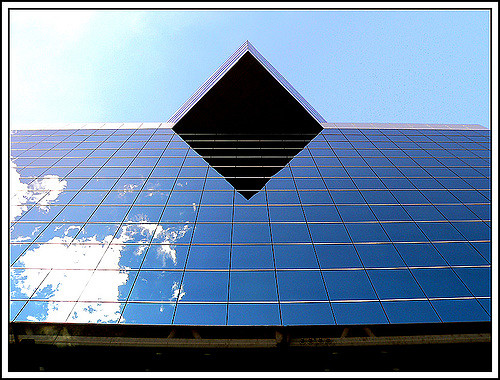
I’m not sure if I’ve mentioned it explicitly before, but I am part of the Indian outsourcing world. My job at Trivandrum’s Technopark involves proofreading medical letters, and I am the only foreigner in my company. While Kerala is a world away from Mumbai, I feel qualified to pass judgment on two aspects 0f NBC’s new situation comedy ‘Outsourced’:
(1) whether or not it is true to life (because I am essentially the show’s main character)
(2) whether or not it is funny (because of my ability to notice what makes me laugh)
To answer (1), let me compare a few situations in the show to how they might play out in my life.
In the first episode, Todd meets his staff by going around the office introducing himself to each of them. The assistant manager tags along quietly beside him. In my office the manager would do all the talking, describing both me and my new colleague for each other’s benefit without either of us really having to say anything. Inaccurate.
The staff are immediately revealed to be a collection of stereotypes: the petite and quiet girl, the ambitious and business-obsessed assistant manager, the attractive and assertive girl, the cool and flirtatious young guy and the overweight dude who won’t shut up. In my office, it takes literally years for some colleagues to reveal their character to you, and generally interactions are kept to business – to wit, they bring as little character to work as possible, saving it for after hours. If you’re lucky, you get to spend time with them after hours and get to know them better. Inaccurate.
Todd’s fellow foreigners in his Outsourcing Building are a dinki di Aussie chick and Diedrich Bader. I have never seen a dinki di Aussie chick anywhere near my Outsourcing Building, and I most definitely haven’t seen Diedrich Bader. Inaccurate.

In the second episode, the office break room is shown to be colourful and filled with a number of snacks and tea-and-coffee-making facilities, with laughter emanating from the mingling men and women on the staff. My break room has some chairs and tables, a big sink, one BRU tea/coffee machine, and a water cooler. The walls are white and bare. The staff generally sit segregated according to gender, and those that mingle with the opposite sex do so very quietly so as not to attract too much attention. They are also usually married couples. Inaccurate.
Todd cannot comprehend the famous Indian head-wobble, so Asha – the attractive and assertive girl – demonstrates it for him by taking his head in her hands and moving it slowly from side to side, all the while looking into his eyes and giggling. If any single one of my female colleagues did this to me, my head would explode right there in their hands – we have barely exchanged a single handshake in two whole years. Inaccurate.
Finally, Gupta unleashes a tirade against all of his fellow staff, pointing out everything that he hates about each of them. In my office, where dancing carefully – and with a smile – around the people you dislike is elevated to an art form, this would only be within the realms of possibility if someone were drunk. It might even become likely in such a case. Gupta, however, is not drunk. Inaccurate.
Verdict: Even allowing for the fact that I work in far-more-conservative Kerala, on point (1), Outsourced gets a FAIL.
Answering (2) is much simpler: did I laugh? Well, a majority of the jokes were infantile, such as the parade of ridiculous items sold by All American Novelties, Todd’s company. Stupid does not equal funny.
Others COULD have been funny, but were lazily thrown in rather than stretched to their capacity, like when Manmeet is saying goodbye to one of his phone girlfriends and manages to sell her a teddy bear that plays recordings. He asks her what he should record into it for her to listen to when she goes to sleep at night. I would have laughed hard if he’d sat there in silence for ten seconds, getting progressively more disgusted as he listened to her obviously filthy request; as it was, he quickly told her “I can’t make a cute little teddy bear say that”. This is spoonfeeding where it really wasn’t necessary – a lot of the best humour allows room for the audience to read something into it, and I wish the writers had realised this.

Most importantly, in each episode several jokes were downright offensive, and they WERE often stretched to their limits, making for even more excruciating cringes. For example, when Todd spots a COW outside the office WINDOW and then, after listening to a long SPEECH about HINDU BELIEFS, asks “So, what time is lunch?”. NOT COOL. Also, when Gupta goes on that afore-mentioned ‘I hate you all’ rant he comes to “Mr All-American”… and has absolutely nothing to say! What?! He’s perfect, while all of the Indians have negative characteristics? Between this and the constant stereotyping, I detect a hidden agenda!
Verdict: I understand that people have different beliefs on what is and isn’t funny, but in the eyes of this viewer, Outsourced is DOUBLY NOT FUNNY – once for failing to make me laugh, and once for pissing me off at the same time.
I guess all this indicates that the show is on the fast track to cancellation. However, as Peta Jinnath Andersen notes in her article at The NRI, the pilot pulled in an impressive number of viewers, so who knows? She and Amitha Knight, who are both Indians in the USA, have written well about it, so check out their pieces (both of which are of course much more insightful than mine).
As it stands, I will be tuning in for the third episode to see if it can elevate itself in any way. Even with the bar set so low, I’m not holding my breath.




